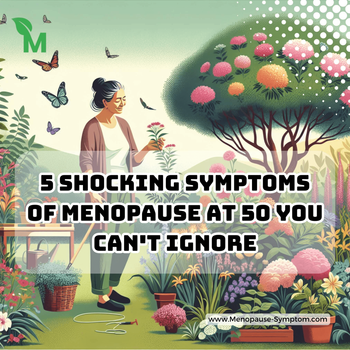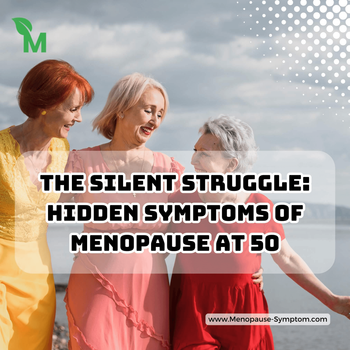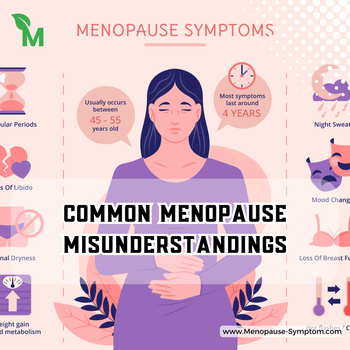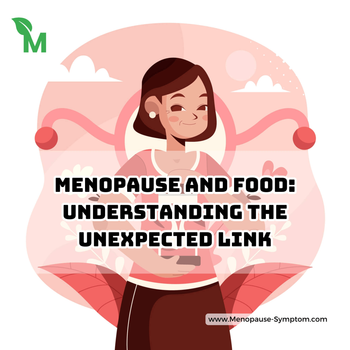The 5 Most Common Symptoms Of Menopause At 50
On
07/10/2024Reading time:
3 min
Summary:
Menopause is a significant milestone in a woman's life, marking the end of her reproductive years. As women approach their 50s, they often begin to experience a range of symptoms associated with this natural transition.
Navigating the Change: Understanding Menopause Symptoms at 50
Understanding the symptoms of menopause at 50 can help you better manage your health and well-being during this transformative period.
What is Menopause?
Menopause occurs when a woman has gone 12 consecutive months without a menstrual period. This transition typically happens between the ages of 45 and 55, with the average age being 51. During menopause, the ovaries gradually produce less estrogen and progesterone, leading to various physical and emotional changes.
5 Common Symptoms of Menopause at 50
Hot Flashes: The Sudden Heat Wave
Hot flashes are perhaps the most infamous symptom of menopause. These sudden sensations of intense heat can spread throughout the body, often accompanied by redness in the face, neck, and chest. Lasting anywhere from a few seconds to several minutes, hot flashes can be particularly disruptive when they occur at night as night sweats.
Mood Swings: Riding the Emotional Roller Coaster
Hormonal fluctuations during menopause can lead to unpredictable mood swings. You might find yourself feeling content one moment and irritable or tearful the next. These emotional shifts can be exacerbated by other menopause-related issues such as sleep disturbances and stress.
Vaginal Dryness: Discomfort Down Below
As estrogen levels decline, the vaginal tissues may become thinner and less lubricated. This can result in discomfort during intercourse and increase the risk of urinary tract infections. Vaginal dryness is a common but often under-discussed symptom of menopause at 50.
Weight Gain: The Battle of the Bulge
Many women experience weight gain during menopause, particularly around the midsection. This can be attributed to hormonal changes, slowing metabolism, and lifestyle factors. Maintaining a healthy diet and regular exercise routine becomes increasingly important during this time.
Sleep Disturbances: Restless Nights
Menopause can wreak havoc on your sleep patterns. Night sweats, anxiety, and hormonal fluctuations can all contribute to difficulty falling asleep or staying asleep throughout the night. This can lead to daytime fatigue and difficulty concentrating.
Managing Menopause Symptoms
While the symptoms of menopause at 50 can be challenging, there are several ways to manage them effectively:
Hormone Replacement Therapy (HRT): This involves taking synthetic hormones to replace those no longer produced by the body. While effective for many women, HRT may not be suitable for everyone due to potential risks.
Lifestyle Modifications: Adopting a healthy diet, regular exercise routine, and stress-reduction techniques can significantly alleviate menopause symptoms.
Natural Remedies: Some women find relief through herbal supplements, acupuncture, or yoga. However, it's essential to consult with a healthcare provider before trying any alternative treatments.
Non-Hormonal Medications: Certain antidepressants, blood pressure medications, or other prescription drugs may help manage specific menopause symptoms.
When to Seek Medical Advice
While menopause is a natural process, it's important to consult your healthcare provider if you're experiencing severe or disruptive symptoms. They can help you develop a personalized treatment plan to manage your menopause symptoms effectively.
Embrace the Change
Remember, every woman's experience with menopause is unique. By understanding the common symptoms of menopause at 50 and exploring various management strategies, you can navigate this transition with confidence and grace. Embrace this new chapter of life, armed with knowledge and support to help you thrive during menopause and beyond.
Source: Team MPS compiled, analyzed and wrote. Please dont reup without source of us. Many thanks.

5 Shocking Symptoms Of Menopause At 50 You Can't Ignore
Invalid Date
Are you approaching your 50s and noticing some unexpected changes in your body? You're not alone.

The Silent Struggle: Hidden Symptoms Of Menopause At 50
Invalid Date
Understanding the Unseen Battle. As women approach their fifties, they often find themselves facing an unexpected and sometimes bewildering array of changes. These changes, while natural, can be confusing and even alarming if you're not prepared for them.

Common Menopause Mistakes To Avoid
Invalid Date

Common Menopause Misunderstandings
Invalid Date

Menopause And Food: Understanding The Unexpected Link
Invalid Date

Menopause And Mindfulness: Finding Inner Peace
09.02.2024
Menopause is a natural transition in a woman’s life, usually occurring between the ages of 45 and 55. It brings with it many physical and psychological changes that can leave many feeling confused and anxious.
